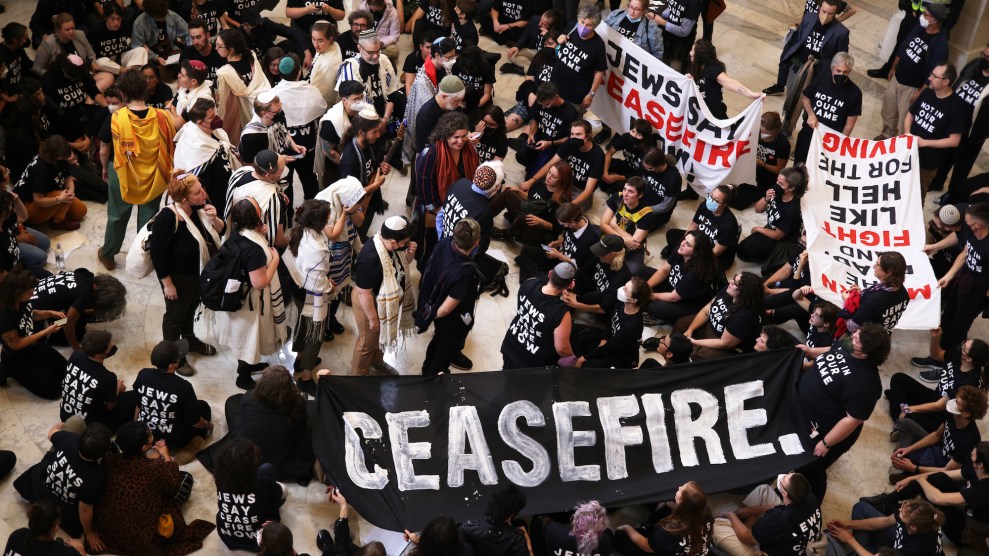In the throes of the pandemic, Darcy Pollard’s first full-time job was pulling long hours on the digital team of the Biden-Harris 2020 campaign. From her childhood bedroom in Maryland, Pollard monitored where on the web the campaign’s ads popped up in order to ensure Biden’s ad dollars were being spent wisely.
At the time, Pollard was eager to help elect Biden over President Donald Trump, hoping a Democratic victory would lead to meaningful differences in health care and student loan reform. Four years later, she has mixed feelings about what many would consider an impressive bullet point on a young politico’s resume. “I feel incredibly embarrassed for having worked for him,” says Pollard, who was 20 when she started the job during a gap year in college. “I’m glad I did the work, but it’s really hard to have my name attached to him now.”
She was one of more than 500 former Biden 2020 staffers who in November signed an open letter imploring Biden to call for an Israeli ceasefire. As of mid-February, at least 28,000 people—including thousands of children—have died in the ongoing conflict. Roughly 2 million people have reportedly been displaced.
Some of the signers, like Pollard, believe Biden is complicit in the destruction. They cite his failure to pressure Israel to de-escalate its assault on Gaza and his administration sending unconditional military aid to Israel, bypassing congressional approval in the process.
“Mr. President, you have spoken intimately about the unbearable pain and grief of losing a child—we were shocked and saddened to see you justify the death of Palestinian children as ‘the price of waging a war,’” read the letter Pollard signed.
The sentiment that Biden is blundering the crisis in the Middle East is widely shared within Pollard’s age cohort. A New York Times poll in late December revealed that only 3 percent of voters between 18 and 29 strongly supported the president’s handling of the Israel-Hamas war; nearly half of these voters strongly disapproved. Even among Democrats, Biden is increasingly at odds with one of the party’s largest voting blocs: the youth. Between October and November, the proportion of young Democrats who viewed Biden as “too pro-Israeli” doubled, increasing from 21 percent to 42 percent, according to a University of Maryland–Ipsos poll.
But the political issue Biden faces in 2024 isn’t merely that young people might not feel compelled to vote for him. Young people like Pollard—often childless and more able to take on low-paid or even unpaid entry-level campaign work with unconventional hours and an abrupt end date of November 6—might not feel motivated to campaign for him.
“Personally, I would have a harder time going to work for them,” remarks Gwen Schroeder, who says at 40 she was the oldest member of a Biden 2020 video team. She adds, “We have missed the opportunity to save countless lives, and to do literally anything to pressure Netanyahu to take a different approach.” Schroeder signed the letter from 2020 Biden campaign workers, but says she will still support Biden over Trump because she feels Trump is more dangerous.
In addition to those Biden 2020 staffers who have protested, 17 current Biden 2024 staffers recently urged the president to press for a permanent ceasefire in an open letter. Several prominent young TikTok and Instagram influencers who have promoted Biden’s policy agenda through White House events are also growing disillusioned with the administration, citing Biden’s position on Israel and Palestine as a primary factor. And more than a half-dozen current and former leaders from large, youth-centric grassroots political organizations, such as March for Our Lives, GenZ for Change, and the Sunrise Movement, penned their own letter in November calling on Biden to restrain Israel.
“Young people are a cornerstone of a winning Democratic coalition, and the vast majority of young people in this country are rightfully horrified by the atrocities committed with our tax dollars, with your support, and our nation’s military backing,” these activists wrote. “We did not spend hours upon hours knocking doors and making calls to turn out the vote so that you could support indiscriminate slaughter of civilians and violations of international law.”
The open letters may be the tip of the iceberg of the eroding support among young progressives. Conversations with more than a dozen former Biden 2020 staffers, senior aides from other past Democratic presidential campaigns, leaders of political canvassing networks, and content creators with large youth followings suggest mounting outrage with the president’s longstanding deference to Israeli Prime Minister Benjamin Netanyahu will cause young foot soldiers who typically do much of the work to turn out the Democratic vote to sit this election out. Some will neither vote for Biden nor do the pivotal work of encouraging other voters to turn out.
“Increasingly, our democratic elections are extremely reliant on young people,” Usamah Andrabi, communications director for Justice Democrats, which helps elect progressive leaders such as Alexandria Ocasio-Cortez and Ayanna Pressley, tells Mother Jones. “Not only are we talking about the staff of these campaigns, but we’re talking about the people they’re mobilizing.”

Few people understand the importance of young people in campaign apparatuses as well as Kunoor Ojha, who served as the director of student organizing for the 2016 bid of Bernie Sanders, and later, Hillary Clinton.
Sanders’ Nashua, New Hampshire, office, where Ojha started the 2016 cycle, was, in her words, “like basically every office on every Democratic campaign, staffed by almost entirely young, under-25-years-old, field organizers.” At the time, Ojha herself was 25.
There, Ojha oversaw field workers who hosted nonstop phone banks in the evenings and did marathon door-knocking stints on weekends. “You’re bundling up in the cold knocking doors for hours with volunteers. You’re staying in the office late at night, tallying up everyone that you talked to that day, and everyone that your volunteers talked to over the phone,” she says. “You’re meeting with volunteers in coffee shops and restaurants to try and understand their passion and if you can get them more engaged.”
The volunteers included “high school students and young people working part-time jobs at coffee shops and restaurants who were drawn to Sanders’ economic message.
The work of Ojha’s young field workers—and the volunteers they recruited—paid off big for Sanders in the Granite State. He bested Clinton there by more than 22 points, with exit polls showing 83 percent of Democrats aged 18 to 29 supporting Sanders.
Relatively insufficient youth engagement may have contributed to Clinton’s 2016 loss in the general election. When Ojha joined Clinton’s team in the summer of 2016, she says, she was the first national staffer dedicated to mobilizing student and campus voters in the general election. Clinton ultimately received 55 percent of votes among people age 18 to 29; Obama received 66 percent in 2008 and 60 percent in 2012.
Youth engagement also played a significant role in Biden’s 2020 victory. The Center for Information and Research on Civic Learning and Engagement estimated that roughly half of adults under 30 cast ballots in 2020, matching the proportional turnout for Barack Obama’s first presidential election.
Biden’s win was assisted by progressive youth-led groups, like Sunrise Movement, whose 3,000-plus volunteers engaged with 3.5 million young voters encouraging them to vote for Biden after his campaign heeded the group’s calls to beef up his climate positions. Biden’s 2020 campaign also worked with more than 90 social media influencers who landed 264 million “impressions” and 2.1 million “engagements.”
Fast-forward to Biden’s current campaign against Trump, and there’s little involvement from progressive grassroots groups such as Sunrise and Justice Democrats, which helped defeat Trump in 2020.
“Biden’s policies have made our jobs a lot harder,” says Michele Weindling, Sunrise’s political director. “There’s a lot of questioning and silence [within Sunrise]. There just isn’t a clear path forward to seeing Biden as a candidate that people feel speaks to them and represents them. And that makes it really hard to build a robust strategy that accounts for his election.”
Beyond volunteer groups, the Biden campaign may face headwinds in recruiting enough field workers. The campaign’s jobs page currently shows more than six dozen openings, including one listing for a “youth engagement intern” spot that’s open in multiple states.
“I would not want to be in the shoes of a young or mid-level staffer running a field office this year,” says Ojha. “I think it is already a pretty tough year for hiring. There are hundreds and hundreds of jobs that this campaign needs to fill. Several hundreds of those would usually be filled by twentysomething field organizers. I think it’s going to be hard to fill all those roles. And if they can’t do that, that just makes the whole situation a lot scarier in those states we know are going to be field-margin states: the Pennsylvanias, the Arizonas.”
Even among the TikTok and YouTube thought-influencers the Biden administration has sought to work with, inviting them to bill signings and special press briefings, more and more have begun to speak out against Biden’s positions on Israel and Palestine.
Consider George Lee, an internet personality and educator whose “Conscious Lee” TikTok channel has 2.5 million followers. In 2020, Lee says, he used his platforms to support local Democratic candidates and oppose Trump. In 2022, Lee was invited by the Biden White House to attend a State of the Union watch party and share his experiences from that event online. By the end of 2023, Lee was posting multiple videos pointing out times he believed Biden had lied about the Israel-Hamas war.
“If you told me that there would be genocide whether we have Trump or Biden…That whether Trump or Biden was in office, the Supreme Court was still going to overturn Roe v. Wade. That whether Trump or Biden was in office, they would still overturn affirmative action—I think that there will be a lot more individuals that do not participate in this election,” Lee says.
V Spehar, a content creator whose UnderTheDeskNews channel has 3 million followers on TikTok, thinks Biden could learn from the young creators who have expanded their platforms through authentic content. Spehar says Biden would make huge leaps with young people by leveling with them about policy mistakes in the Middle East.
“If he came out on TV right now and was like, ‘Fuck Netanyahu. That Motherfucker punk’d me so bad.’ Oh my god. I’m trying to be cool with him and he comes out here and says this crazy-ass thing,'” says Spehar, who was invited to the White House to see Biden sign the Inflation Reduction Act. “I think people would be like, ‘Yo, okay, yeah, we’ve all had a friend betray us, I can understand that.'”

Biden allies are far from considering the brazen approach Spehar suggests. But some acknowledge there’s a disconnect between older and younger Democrats.
In November, a group of top Biden campaign aides and Obama alumni converged in Chicago to celebrate the 15th anniversary of Obama’s 2008 election victory. While there, dozens of them gathered in a Sheraton conference room to discuss Biden’s 2024 campaign.
At the meeting, previously reported by New York magazine, Obama alumni had questions for the Biden camp. “How might third-party candidates affect youth turnout? What’s your precise understanding of how to reach voters with inscrutable media-consumption habits?” New York reported.
An Obama alumnus who was in the room had another question. “Where are the young people?” this person, who requested anonymity, said to Mother Jones. “They’re not here. They’re not in this room.”
But other experts in Democratic politics suggest the erosion or absence of youth in Biden’s campaign might not be as high of an obstacle to Biden’s reelection as pundits and left-wing progressives paint it to be.
“There is just a functional reality of the political numbers that there are more Boomers in this country than there are Gen Z,” says Christopher Hale, a staffer of the Obama-Biden White House and Obama’s 2012 campaign, who also ran for Congress in southern Tennessee.
The Biden campaign could also try to make up for the lack of young volunteers with paid canvassers. “Of course it’s helpful when the people that you’re engaging to do the work are passionate and driven,” says longtime Democratic strategist Melissa DeRosa, “but at the same time—not to be cynical—you can also do a lot of paid canvassing. As long as you can raise the money to get the bodies on the street to pull the identified voters, it almost doesn’t matter. You’re never going to recapture the magic in a bottle that we had in 2008 with someone like Barack Obama, where the interest and the enthusiasm were so pure and so mission-based. You didn’t see that before and you haven’t seen it since.”
Further, there’s a concern among some Democratic strategists, Hale says, that doing too much to sway young voters, who tend to be far more liberal, would vex middle-aged and older moderate voters, especially former Republican or swing voters who dislike Trump more than they dislike Biden.
Recent Quinnipiac University polling on Sen. John Fetterman (D-Pa.) offers some reassurance that a more pro-Israel policy stance is being well received among older cohorts—though not so much among the youth. Fetterman, whose metamorphosis from a progressive gym-short wearing populist to a (still-gym-short-wearing) pro-Israel hawk has riled young liberals who helped him get elected, has only 28 percent of registered voters in Pennsylvania age 18 to 34 now expressing a favorable view of the senator. But among voters age 65 and above, 56 percent have a positive perception.
“At the end of the day, this campaign does not want to win over MSNBC hosts,” says Hale. “And it doesn’t want to even win over young progressives. It wants to win over reliable voters. And young progressives, for better or worse, are not reliable voters right now.”
If that’s the calculus, it’s working. Darcy Pollard, the young progressive from Maryland, doesn’t feel particularly won over. Nor is she doing much to convince people to vote for her old boss. When her peers mention they are considering not voting for a presidential candidate in November, the former Biden 2020 staffer offers a somber expression of understanding: “I see where you’re coming from.”













